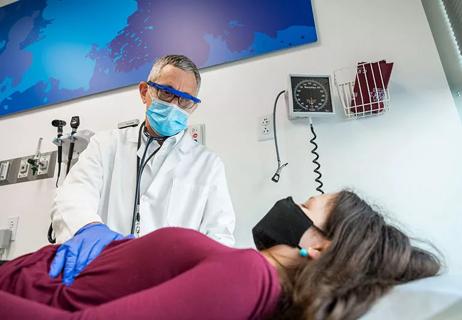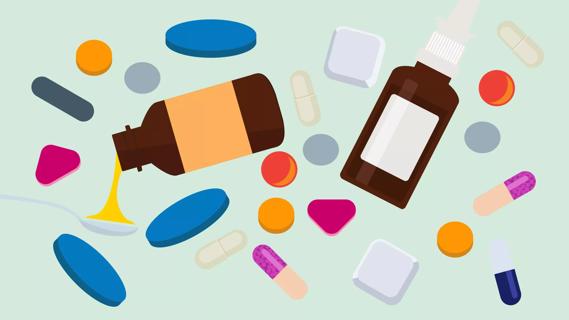Your first point of health contact

If you have a medical need — sudden flu symptoms, nagging back pain, an unexpected rash or even think you might have COVID-19 — who is your first point of contact?
Cleveland Clinic is a non-profit academic medical center. Advertising on our site helps support our mission. We do not endorse non-Cleveland Clinic products or services. Policy
A family physician can be the right answer for most healthcare situations.
Medical emergencies are an exception. An emergency is a valid reason to visit the emergency room — but far too many Americans use the ER or urgent care as their primary source of care. It’s one reason among many we spend more as a country on healthcare than anyone else, yet still rank far from the top in health outcomes.
Using more primary care physicians — including family doctors — can help. Here family medicine specialist Michael Rabovsky, MD, explains just a few of the benefits for you and your family.
“I treat toddlers. I care for teens and people in their 20s. I treat middle-aged adults, retirees and people well into their 90s,” Dr. Rabovsky says. “I often see these same patients for years or even decades.”
That’s typical of family practitioners, he notes. Because family doctors treat a wide range of conditions, they can be your primary care physicians at any point in your life.
“In the long term, that means you can build a lasting relationship with a family physician,” Dr. Rabovsky says. “And building such a relationship means they truly get to know you.”
When doctors treat you for years, they get to know your medical history inside and out. That helps them make accurate diagnoses, watch for red flags regarding medications and monitor changes in your health through the years.
But the “family” in family doctor matters, too. “Seeing multiple generations of a family can help a doctor record an accurate, in-depth family health history,” Dr. Rabovsky says. “For example, if I know you had cancer at a young age, and so did your mother, that’s a red flag. I will recommend genetic counseling and offer a screening plan not only for you but also for other family members at risk.”
Medical history is just part of the picture. Sometimes it helps to know what’s happening at home, too. When treating a child whose parent just lost a job, for instance, that information comes into play when assessing stress and anxiety.
“When doctors treat you for years, they get to know your medical history inside and out,” he says.
Yes, family doctors do your yearly check-up. But they also can help you manage chronic conditions such as heart disease, diabetes and arthritis. They can treat acute situations such as sinus infections and injuries. They can help you throughout a pregnancy.
They also can perform minor surgical procedures, such as freezing a wart or draining an abscess. These are but a few examples, and the list goes on.
When you need to see a specialist for heart disease, cancer or any other serious concern, a family doctor can help find someone who fits your specific needs — and personality.
Here’s an example: “Say I have a patient who needs to see a cardiologist. I know from years of experience this patient prefers conservative treatments,” Dr. Rabovsky says. “That means I’ll search for a cardiologist who takes a conservative-first approach rather than someone known for aggressive treatment.”
There’s ample evidence — both here in America and abroad — that using more primary care saves money for a healthcare system.
For example, according to an insurance study, a 23% increase in primary care spending in Rhode Island led to an 18% reduction in total healthcare spending.
And data suggests that adding one primary care physician (such as a family doctor) for every 10,000 people can lower hospital admissions by 5.5%, emergency room visits by 11% and surgeries by 11%.
“Those numbers are even more impressive than cost savings,” Dr. Rabovsky says. “Family doctors can certainly save the country money, but more importantly, they can offer your family better health.”
Learn more about our editorial process.

The short answer from a primary care specialist

Your body works overtime to keep you cool on hot summer days, bringing on sun fatigue

Bleeding is a risk and warrants taking care, but the reward of this lifesaving medication is great

Some natural home remedies may offer relief, but they lack scientific evidence and won’t typically cure the condition

Some types of expired meds may not be harmful, but they probably aren’t worth the risk

Leaving footwear on invites germs, bacteria, toxins and other unwanted guests into your home

Besides questionable effectiveness, herbal supplements aren’t safe for everyone

Start slowly with clear fluids, and then move to bland, easy-to-digest foods

Your metabolism may torch 1,300 to 2,000 calories daily with no activity

A gentle touch in all the right places may help drain your sinuses